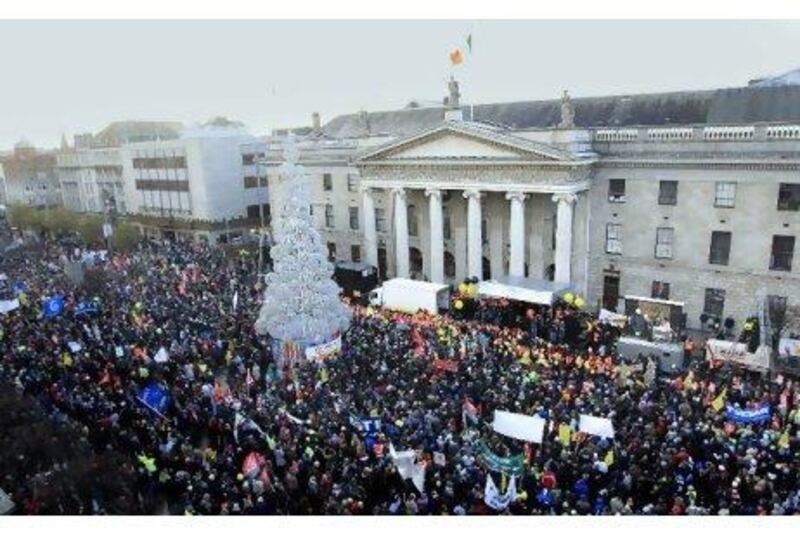DUBLIN // Protesters took to the streets of Ireland's capital yesterday in the first large public display of anger over spending cuts and tax increases at the centre of an imminent multimillion-euro international bailout.
The rally came as the country's embattled government accelerated efforts to conclude negotiations with teams from the European Union and International Monetary Fund on an estimated €85 billion (Dh413bn) loan package before international bond markets open tomorrow.
The intensification of talks in Dublin followed nervous trading last Friday when Ireland's borrowing costs hit record levels, bank shares across Europe tumbled and speculation intensified that Portugal and Spain would be the next euro zone members to resort to a bailout.
About 50,000 people braved snowstorms and freezing temperatures to attend yesterday's trade union-organised rally, the first major demonstration since Ireland was forced a week ago to open negotiations on an EU/IMF loan in a desperate bid to rescue the country's stricken finances and shore up its debt-ridden banks.
The marchers congregated outside the city's General Post Office - site of the 1916 declaration of the nation's independence from Britain - to hear calls for budget measures to hit the rich and the banks instead of ordinary citizens who are already struggling with reduced wages.
The Irish author and commentator Fintan O'Toole told the gathering that the government was doing a deal with people who were never elected - a reference to the negotiators from the EU and IMF.
"People are willing to make sacrifices. They just don't want to be the sacrifice. We are not subjects. We are citizens, and we want our republic back," he said.
Protesters waved banners with slogans proclaiming "Why save German bankers - default now," and "No country for young men", a reference to the growing numbers of people leaving the country to look for work overseas.
Tara O'Neill, 31, a software engineer who travelled from her home in County Cork, about 250km from Dublin, said: "I am here mainly because I don't agree with the way they are dealing with the banks. I don't really agree with the trade unions, but it's the only march I could find to come on."
The protests follow last week's unveiling by the deeply unpopular government of €10bn in spending cuts and €5bn in tax measures over four years.
The measures, which form a key part of the EU/IMF crisis negotiations, aim to reduce a budget deficit that is projected to hit 32 per cent of the country's gross domestic product this year - the highest in Europe since the Second World War.
The four-year plan proposes cuts to welfare payments, pensions and the minimum wage and raises virtually all forms of tax, except the 12.5 per-cent corporate tax rate that Ireland applies to business profits.
About €6bn of the €15bn savings will be "front-loaded" in an emergency 2011 budget due to go before parliament on December 7, which Irish and European officials say must be passed to clear the way for the rescue loan.
However, a by-election defeat last Friday that saw the prime minister Brian Cowen's already slim parliamentary majority shrink to just two, has cast further doubt on his government's ability to secure majority backing for the budget.
Pearse Doherty from the leftist Sinn Féin took the Donegal South West seat, saying the vote sent a message to Mr Cowen to "get out of office".
The loss is particularly painful as Mr Cowen's centre-right Fianna Fáil had held the seat since the party was founded in 1932.
Mr Cowen, whose ruling coalition began to unravel last week, has already offered to hold an early general election in February or March - but only after all budget measures have been approved in parliament.
It remained unclear last night whether senior bank bondholders - previously considered untouchable - would be forced to accept losses arising from the severe bank restructuring measures expected to be included in the rescue package.
Reports last week that such moves were on the table sent shock waves throughout international markets last Friday, leading to sharp declines in the value of senior debt in the country's three main banks, Allied Irish Banks, Bank of Ireland and Anglo Irish Bank.
However, there was growing speculation at the weekend that a state guarantee given to these investors by the finance minister Brian Lenihan in 2008 cannot be reversed.
This guarantee effectively transformed the Irish banks' losses into Irish government liabilities, while the escalating cost of rescuing the banks since then has undermined the ability of the Irish State to borrow on the international bond markets.
In addition to the €45bn of taxpayers' money that the government has already committed to the banks, it is now expected that some €35bn of the bailout loan will go to ensure their liquidity.
The government will use the rest of the loan to fund the country for the next three years.
Protests against government austerity measures yesterday were not limited to Ireland.
In Rome, tens of thousands marched in a rally organised by Italy's largest union to protest bleak job prospects and demand more rights for workers.
And in Vienna, several thousand demonstrators gathered to protest against the Austrian government's plan to cut state expenses in education, health care and family allowances.
* with additional reporting by The Associated Press






